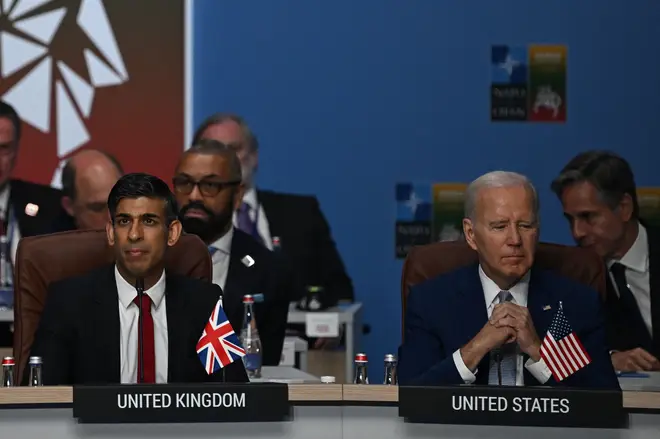
The UK and US launched strikes against Houthi rebels in “self defence” after a series of “intolerable attacks” against vessels in the Red Sea, Defence Secretary Grant Shapps has said.
On Monday, the US and British militaries conducted joint airstrikes targeting Houthi missile sites in Yemen for the second time in less than two weeks.
Eight targets were hit in the strikes, including an underground storage site and Houthi missile and surveillance capability, the Pentagon said.
The Houthi rebels, who are based in Yemen and backed by Iran, have been attacking Western vessels in the Red Sea – an important global trade route.
The UK and US first launched joint strikes against the rebel group on January 11, after which the Houthis vowed brutal retaliation.
Mr Shapps confirmed the UK’s involvement in the strikes, which included the use of four RAF Typhoons, supported by a pair of Voyager tankers.
The White House confirmed on Monday that Rishi Sunak had spoken with US President Joe Biden about the ongoing attacks against naval vessels in the Red Sea.
Mr Biden and Mr Sunak reiterated “their commitment to freedom of navigation, international commerce, and defending mariners from illegal and unjustifiable attacks”.
A White House spokesperson said: “The president and prime minister discussed the importance of increasing humanitarian aid and civilian protections for people in Gaza, and securing the release of hostages held by Hamas.”
After the first wave of attacks, which took place earlier in January, the Ministry of Defence said “particular care was taken to minimise any risks to civilians” and “any such risks were mitigated further by the decision to conduct the strikes during the night”.
A joint statement from governments across the world, including the US, UK, Canada, Australia, the Netherlands, and Bahrain, said eight Houthi targets in Yemen were hit.
“These precision strikes are intended to disrupt and degrade the capabilities that the Houthis use to threaten global trade and the lives of innocent mariners, and are in response to a series of illegal, dangerous, and destabilising Houthi actions since our coalition strikes on January 11,” they said.
“Today’s strike specifically targeted a Houthi underground storage site and locations associated with the Houthis’ missile and air surveillance capabilities.
“The Houthis’ now more than thirty attacks on international and commercial vessels since mid-November constitute an international challenge.
“Recognising the broad consensus of the international community, we again acted as part of a coalition of like-minded countries committed to upholding the rules-based order, protecting freedom of navigation and international commerce, and holding the Houthis accountable for their illegal and unjustifiable attacks on mariners and commercial shipping.
“Our aim remains to de-escalate tensions and restore stability in the Red Sea, but let us reiterate our warning to Houthi leadership: we will not hesitate to defend lives and the free flow of commerce in one of the world’s most critical waterways in the face of continued threats.”
In a statement following UK-US strikes on Houthi targets in Yemen, Defence Secretary Grant Shapps said: “Dangerous Houthi attacks on shipping in the Red Sea have continued to threaten the lives of sailors and disrupt shipping at an intolerable cost to the global economy.
“Along with our US partners, we have conducted a further round of strikes in self-defence. Aimed at degrading Houthi capabilities, this action will deal another blow to their limited stockpiles and ability to threaten global trade.
“Alongside our ongoing diplomatic efforts, we will continue to support regional stability across the Middle East, working hand in hand with our like-minded partners.”
However, the latest operation could raise fresh questions about the need to consult Parliament over military action. It is understood that in contrast to the strikes on January 11, neither Labour leader Sir Keir Starmer nor Commons Speaker Sir Lindsay Hoyle were briefed about the operation.

The latest barrage of allied attacks follows an almost-daily assault on Houthi missile launchers by US fighter jets and ship-based Tomahawks over the past week.
The rapid response missions, which officials said go after launchers armed and ready to fire, demonstrate the military’s increasing ability to watch, detect and strike militant activities in Yemen.
The chaotic wave of attacks and reprisals involving the United States, its allies and foes suggests the retaliatory strikes have not deterred the Houthis from their campaign against Red Sea shipping, and that the broader regional war that the US has spent months trying to avoid is becoming closer to reality.
For months, the Houthis have attacked ships in the region’s waterways that they say are either linked to Israel or heading to Israeli ports.
They say their attacks aim to end the Israeli air-and-ground offensive in the Gaza Strip that was triggered by Hamas’s October 7 attack in southern Israel.
But any such links to the ships targeted in the rebel assaults have grown more tenuous as the attacks continue.
By Kieran Kelly@kellyjourno






